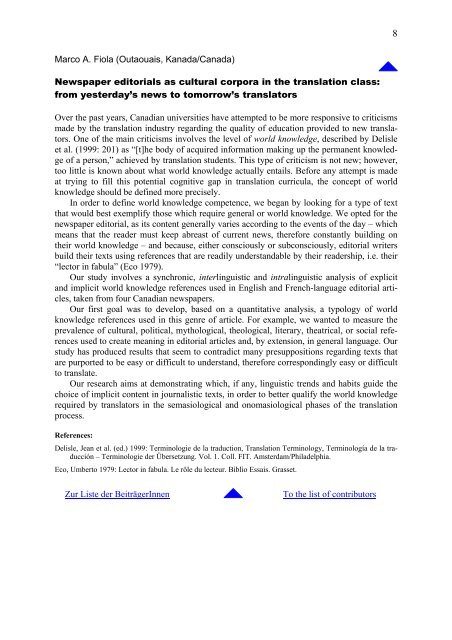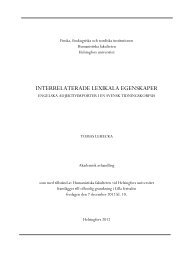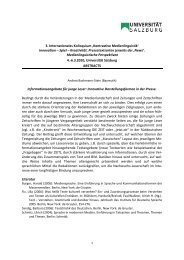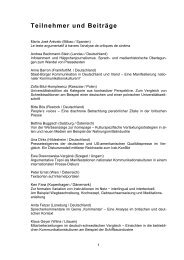Abstracts - Kontrastive Medienlinguistik
Abstracts - Kontrastive Medienlinguistik
Abstracts - Kontrastive Medienlinguistik
Sie wollen auch ein ePaper? Erhöhen Sie die Reichweite Ihrer Titel.
YUMPU macht aus Druck-PDFs automatisch weboptimierte ePaper, die Google liebt.
Marco A. Fiola (Outaouais, Kanada/Canada)<br />
Newspaper editorials as cultural corpora in the translation class:<br />
from yesterday’s news to tomorrow’s translators<br />
Over the past years, Canadian universities have attempted to be more responsive to criticisms<br />
made by the translation industry regarding the quality of education provided to new translators.<br />
One of the main criticisms involves the level of world knowledge, described by Delisle<br />
et al. (1999: 201) as “[t]he body of acquired information making up the permanent knowledge<br />
of a person,” achieved by translation students. This type of criticism is not new; however,<br />
too little is known about what world knowledge actually entails. Before any attempt is made<br />
at trying to fill this potential cognitive gap in translation curricula, the concept of world<br />
knowledge should be defined more precisely.<br />
In order to define world knowledge competence, we began by looking for a type of text<br />
that would best exemplify those which require general or world knowledge. We opted for the<br />
newspaper editorial, as its content generally varies according to the events of the day – which<br />
means that the reader must keep abreast of current news, therefore constantly building on<br />
their world knowledge – and because, either consciously or subconsciously, editorial writers<br />
build their texts using references that are readily understandable by their readership, i.e. their<br />
“lector in fabula” (Eco 1979).<br />
Our study involves a synchronic, interlinguistic and intralinguistic analysis of explicit<br />
and implicit world knowledge references used in English and French-language editorial articles,<br />
taken from four Canadian newspapers.<br />
Our first goal was to develop, based on a quantitative analysis, a typology of world<br />
knowledge references used in this genre of article. For example, we wanted to measure the<br />
prevalence of cultural, political, mythological, theological, literary, theatrical, or social references<br />
used to create meaning in editorial articles and, by extension, in general language. Our<br />
study has produced results that seem to contradict many presuppositions regarding texts that<br />
are purported to be easy or difficult to understand, therefore correspondingly easy or difficult<br />
to translate.<br />
Our research aims at demonstrating which, if any, linguistic trends and habits guide the<br />
choice of implicit content in journalistic texts, in order to better qualify the world knowledge<br />
required by translators in the semasiological and onomasiological phases of the translation<br />
process.<br />
References:<br />
Delisle, Jean et al. (ed.) 1999: Terminologie de la traduction, Translation Terminology, Terminología de la traducción<br />
– Terminologie der Übersetzung. Vol. 1. Coll. FIT. Amsterdam/Philadelphia.<br />
Eco, Umberto 1979: Lector in fabula. Le rôle du lecteur. Biblio Essais. Grasset.<br />
Zur Liste der BeiträgerInnen To the list of contributors<br />
8





